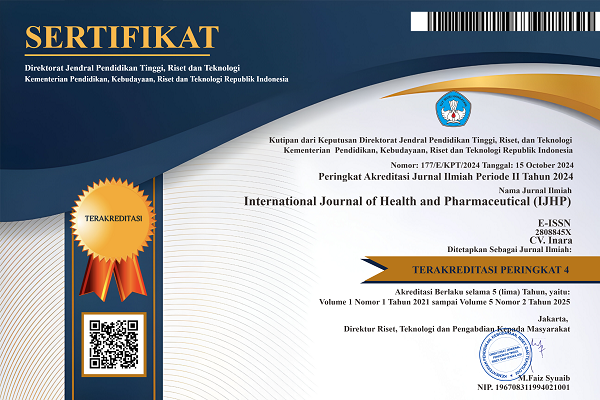Analysis Utilization Of Online Self-Assessment Application (Aladin) In The Licensing Process Of Clinical And Pharmacy Office Of Investment And One Door Integrated Service In Medan City Year 2021
DOI:
https://doi.org/10.51601/ijhp.v2i3.81Abstract
The use of information and communication technology itself has grown rapidly throughout the world during the
COVID-19 pandemic. Developed countries that have succeeded in reducing the number of COVID-19 cases have used
various methods of using information and communication technology. Such as the use of tracking applications installed
on cellular phones, payments using mobile payment applications, the installation of infrared heat detection cameras at
the entrances of public places and crowds, even smart watches with applications that can collect data on heart rate,
body temperature, and sleep patterns to detect signs of viral illness.The purpose of this study was to analyze the use of
the Online Self-Assessment Application (Aladin) in the licensing process for clinics and pharmacies at the Medan City
Investment and One Stop Integrated Service Office in 2021.This research is a descriptive type with a quantitative
approach. In this survey research, a questionnaire is used as a research instrument, in the form of a sheet containing
several questions with a standard structure as a research instrument. Based on the results of research from several
journals using TAM analysis, it was found that perceived ease of use and perceived usefulness had a positive and
significant effect on attitudes toward using and actual system use. Their research results show that perceived ease of
use and perceived usefulness have a positive and significant effect on attitudes toward using and actual system use.
Downloads
References
Abdillah, W., & Hartono, J. (2015). Partial Least Square (PLS) : Alternatif Structural Equation Modeling (SEM)
dalam Penelitian Bisnis (D. Prabantini (ed.)). Andi.
Adani, M. R. (2018). Jenis Aplikasi Berbasis Web Beserta Contoh Penerapannya. Sekawanmedia.Co.Id.
https://www.sekawanmedia.co.id/aplikasi-berbasis-web/amp/
Andriane, C. M. (2020). Analisis Technology Acceptance Model (TAM) Dalam Sistem Informasi Keuangan
Desa (SISKEUDES) - Studi Kasus di Kabupaten Sleman Yogyakarta. Universitas Sanata Dharma Yogyakarta.
Chau, P. Y. K., & Hu, P. J. H. (2001). Information Technology Acceptance by Individual Professionals: A
Model Comparison Approach. Decision Sciences, 32(4), 699–719. https://doi.org/10.1111/j.1540-
2001.tb00978.x
Davis, F. D. (1989). Perceived Usefulness, Perceived Ease of Use, and User Acceptance of Information
Technology. MIS Quarterly, 13(3), 319–340. http://www.jstor.org/stable/249008
Davis, F. D. (1993). User acceptance of information technology: system characteristics, user perceptions and
behavioral impacts. International Journal of Man-Machine Studies, 38(3), 475–487.
https://doi.org/10.1006/imms.1993.1022
Djarwanto, P., & Subagyo, P. (1993). Statistik Induktif. BPFE.
Ghozali, I., & Latan, H. (2015). Partial Least Square : Konsep, Teknik, dan Aplikasi Menggunakan Program
Smart PLS 3.0 Untuk Penelitian Empiris. Badan Penerbit UNDIP.
Hartono. (2008). SPSS 16.0 Analisis Data Statistika dan Penelitian. Pustaka Pelajar.
Igbaria, M., Parasuraman, S., & Baroudi, J. J. (1996). A Motivational Model of Microcomputer Usage. Journal
of Management Information Systems, 13(1), 127–143. https://doi.org/10.1080/07421222.1996.11518115
Kemendagri. (2020). Instruksi Menteri Dalam Negeri Republik Indonesia Nomor 1 Tahun 2020.
Kemenkes. (2020). Keputusan Menteri Kesehatan Republik Indonesia Nomor HK.01.07/Menkes/413/2020
Tentang Pedoman Pencegahan dan Pengendalian Corona Virus Disease 2019 (COVID-19). In
International Journal of Health and Pharmaceutical
MenKes/413/2020. https://covid19.go.id/storage/app/media/Regulasi/KMK No. HK.01.07-MENKES-413-2020
ttg Pedoman Pencegahan dan Pengendalian COVID-19.pdf
Kemenpan RB. (2020). Surat Edaran Menteri Pendayagunaan Aparatur Negara dan Reformasi Birokrasi Nomor
Tahun 2020 Tentang Sistem Kerja Pegawai Aparatur Sipil Negara Dalam Tatanan Normal Baru.
Kemensegneg. (2020). Keputusan Presiden Republik Indonesia Nomor 12 Tahun 2O2O Tentang Penetapan
Bencana Nonalam Penyebaran Corona Virus Disease 2019 (COVID-19) Sebagai Bencana Nasional.
https://covid19.go.id/p/regulasi/keputusan-presiden-republik-indonesia-nomor-12-tahun-2020
MacLeod, M. (2020). New Normal: Are virtual doctor’s appointments here to stay? CVTNews.Ca.
Muntianah, S. T., Astuti, E. S., & Azizah, D. F. (2012). Pengaruh Minat Perilaku Terhadap Actual Use
Teknologi Informasi Dengan Pendekatan Technology Acceptance Model (TAM) (Studi Kasus Pada Kegiatan
Belajar Mahasiswa Fakultas Ilmu Administrasi Universitas Brawijaya Malang). Profit : Jurnal Administrasi
Bisnis, 6(1), 88–113. https://profit.ub.ac.id/index.php/profit/article/view/141/356
Nursalam. (2013). Metodologi Penelitian Ilmu Keperawatan: Pendekatan Praktis (P. P. Lestari (ed.); 4th ed.).
Salemba Medika.
Pemko Medan. (2020). Peraturan Wali Kota Nomor 11 Tahun 2020 Tentang Karantina Kesehatan Dalam
Rangka Percepatan Penanganan Coronavirus Disease 2019 (COVID-19) di Kota Medan.
Priyono. (2008). Metode Penelitian KuantitatifUANTITATIF (T. Chandra (ed.); Edisi Revi). Zifatama
Publishing.
Purnamaningsih, Erhan, T. P., & Rizkalla, N. (2019). Behavioral Intention Towards Application-Based ShortDistance Delivery Services Adoption In Indonesia. Review of Behavioral Aspect in Organization & Society,
(1), 77–86. https://doi.org/http://dx.doi.org/10.32770/rbaos.vol177-86
Sekda Kota Medan. (2020). Edaran Sekretaris Daerah Kota Medan Nomor 904/2908.
Sugiyono. (2013). Metode Penelitian Kuantitatif, Kualitatif, Dan R&D (19th ed.). Penerbit Alfabeta.
Wali Kota Medan. (2018). Peraturan Wali Kota MEdan Nomor 41 Tahun 2018 Tentang Pendelegasian Sebagian
Wewenang Perizinan dan Non Perizinan Kepada Kepala Dinas Penanaman Modal dan Pelayanan Terpadu Satu
Pintu Kota Medan.
Whitelaw, S., Mamas, M. A., Topol, E., & Van Spall, H. G. C. (2020). Applications of digital technology in
COVID-19 pandemic planning and response. The Lancet Digital Health, 2(8), e435–e440.
Downloads
Published
How to Cite
Issue
Section
License
Copyright (c) 2022 Oki Leksmana, Sri Lestari Ramadhani Nasution, Chrismis Novalinda Ginting, Ali Napiah Nasution, Sri Wahyuni Nasution

This work is licensed under a Creative Commons Attribution-NonCommercial 4.0 International License.



























